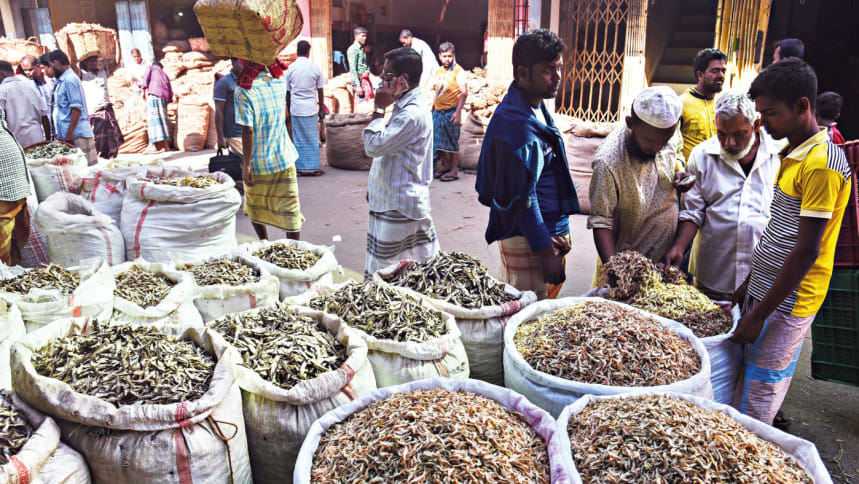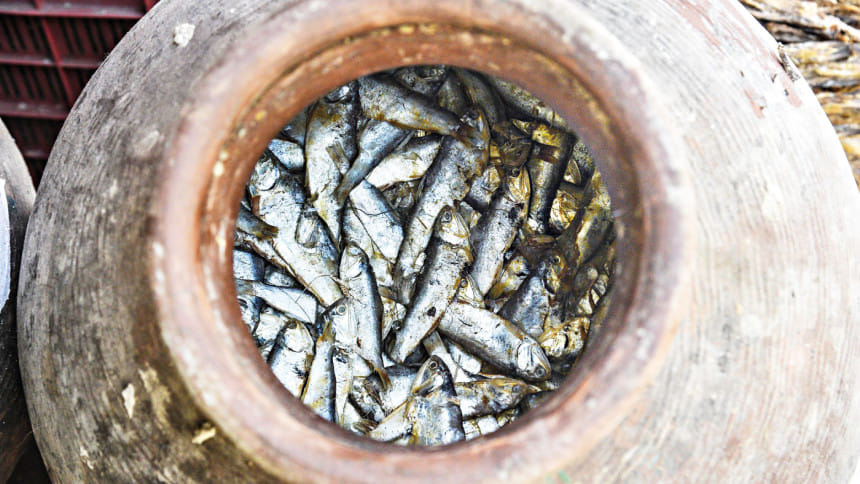Craving shutki? Just head to Ctg Asadganj market
If there's one thing that can be said for certain about the residents of Chattogram, it's that they love "shutki" or as they'd like to call it, "funi".
While some might like to call shutki an acquired taste, for people living in Chattogram and shutki enthusiasts in the country, a warm plate of rice and some spicy shutki is all they want to eat for three meals.
This is why Asadganj dry-fish market, one of the biggest wholesale trading sites for dried fish, has been around for centuries in the port city. Some might even say that the city wouldn't be the same without it.
Almost 50 stockists and more than 260 wholesalers are involved in this trading hub.
What makes this hub so popular, especially among outsiders, is the diversity of dried fish traders have in stock. More than 40 kinds of dried fish are brought here from Cox's Bazar, Saint Martin's Island, Rangbali, Sonadia, Kutubdia, Teknaf, Banshkhali, Anowara and Maheshkhali.

Churri, loitta, icha (shrimp), lakkha, poa, salmon, rupchanda, painsha, kata, hilsha, salmon, moilla -- you name your preference, they have it.
Balachao -- a savory dry fish snack prepared with fried onions and spices -- is also widely available here. However, their prices are as high as their demand.
"People from all over the country come here to get the best dried fishes. One can get a kilo to tonnes of "funi" from here," said Monsur Miah, a wholesale trader at the market.
Although there's a huge demand for dried fish, local production can only meet 25-30 percent of that demand. The government has to support us with incentives to meet this demand.
Winter is the season when the market thrives.
Just to give an idea, each kilo of shrimp shutki here goes for Tk 600 to 1,700, loitta for Tk 300 to 800, churi costs Tk 1,000 to 1,500, while rupchanda goes for Tk 4,000.
As glorious as it sounds, the market also has its fair share of challenges.
Abu Naser, president of Asadganj Shutki Traders Association, said a huge portion of the market's dried fish is directly exported to the UK, US and middle-eastern countries.

"Although there's a huge demand for dried fish, local production can only meet 25-30 percent of that demand. The government has to support us with incentives to meet this demand," he said.
Besides, other issues that this trade is facing are -- over-fishing, robbery and the lack of facilities to allow the spawning of marine fish; issues that the government also needs to address to keep this trade alive, he added.
"This market earns a large deal of foreign currency, that not only benefits our economy, but also allows thousands of traders and fishermen to earn a living," said Abu Naser.

 For all latest news, follow The Daily Star's Google News channel.
For all latest news, follow The Daily Star's Google News channel. 



Comments